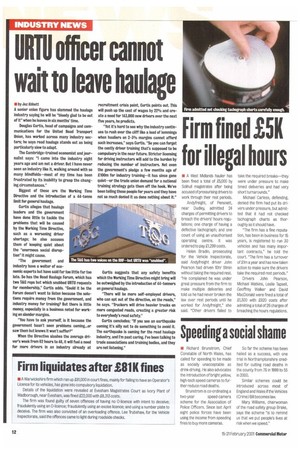UM officer cannot wait to leave haulage
Page 14

If you've noticed an error in this article please click here to report it so we can fix it.
• by Jez Abbott A senior union figure has slammed the haulage industry saying he will be "bloody glad to be out of it" when he leaves in six months' time.
Dougjas Curtis, head of campaigns and communications for the United Road Transport Union, has worked across many industry sectors; he says road haulage stands out as being particularly slow to adapt.
The Cambridge-trained economist and journalist says: "I came into the industry eight years ago and am not a driver. But I have never seen an industry like it, walking around with so many blindfolds—most of my time has been frustrated by its inability to grasp the changing circumstances."
Biggest of these are the Working Time Directive and the introduction of a 44-tonne limit for general haulage.
Curtis alleges that haulage leaders and the government have done little to tackle the problems that will be caused by the Working Time Directive, such as a worsening driver shortage; he also accuses them of keeping quiet about the "enormous social disruption" it might cause, "The government and industry have a welter of economic experts but have said far too little far too late. So has the Road Haulage Forum, which has two T&G reps but which snubbed URTU requests for membership," Curtis adds. "Could it be the Forum doesn't want to listen because the solutions require money from the government, and industry money for training? But there is little money, especially in a business noted for working on slender margins.
"You have to ask yourself, is it because the government hasn't seen problems coming...or saw them but knows it won't suffer?"
When the Directive slashes the average driver's week from 62 hours to 48, it will fuel a need for more drivers in an industry already at recruitment crisis point, Curtis points out. This will push up the cost of wages by 22% and create a need for 143,000 new drivers over the next five years, he predicts.
"Yet it's hard to see why the industry continues to rush over the cliff like a load of lemmings when hauliers on 2-3% margins cannot afford such increases," says Curtis. "So you can forget the costly driver training that's supposed to be compulsory in the near future. Stricter licensing for driving instructors will add to the burden by reducing the number of instructors. Not even the government's pledge a few months ago of 1100m for Industry training—it has since gone quiet—or the trade union demand for a national training strategy gets them off the hook. We've been telling these people for years and they have not so much denied it as done nothing about it."
Curtis suggests that any safety benefits which the Working Time Directive might bring will be outweighed by the introduction of 44-tonners on general haulage.
"There will be more self-employed drivers, who can opt out of the directive, on the roads," he says. "Truckers will drive heavier trucks on more congested roads, creating a greater risk to everybody's road safety."
Curtis concludes: "If you see an earthquake coming it's silly not to do something to avoid it. The earthquake is coming for the road haulage industry, and I'm past caring. I've been talking to trade associations and training bodies, and they are not listening."




































































































